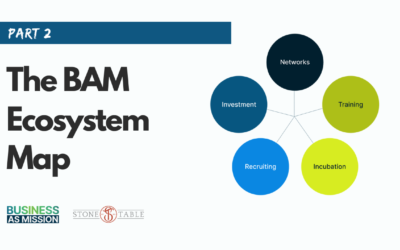A Missionary’s Perspective on the Impact of Credible Business in Sharing the Gospel

This excerpt is from a longer article that originally appeared on the LiveDead blog and as a post at Biblical Missiology. It was shared with their permission. Our friends and partners at LiveDead give their lives to take the Gospel to the unreached people of the earth, often utilizing business and the marketplace to engage the culture with the message of Jesus. We are grateful for their friendship and the vital Kingdom work they do all over the world.
Both Jesus and Paul had credible identities in the context of their day. Jesus took up the legitimate role and identity of a rabbi, which was not only accepted but respected. He added value, both through teaching and through miracles (healings, deliverances, and provisions), and so the common people heard Him gladly (Mark 12:37).
Jesus was able to say difficult, new, and provocative truth BECAUSE He operated from an identity that was understood, [he] contributed, and won popular support.
Paul too was a scholar and started out in the synagogues for scholarly and/or religious debate (Acts 17:2) or used public educational halls and means as the center for his teaching and preaching (Acts 19:19) or seasonally worked in the marketplace in a viable trade (Acts 18:3). At other times he started in the agora (Roman marketplace) as in Acts 17:17.
The point being, both Jesus and Paul had identities that were both understood and respected in context, which propelled them into verbal witness about spiritual matters, as should we.
Legitimate Business
When we add tangible value to society through legitimate business, employing locals, paying taxes, providing services, physically improving our natural surroundings, and integrating into [the culture], it empowers a church-based identity. Men and women globally appreciate work done professionally and [the] value added to their community. In advocating for a public identity that is church-based, missionary in name and function, I insist that this orientation is placed on the foundation of real service at the highest quality that serves the broad community.
For example, in Sudan, I had a church visa and an identity as a pastor. I started a Bible school and an open church. In that church, I preached without reserve on missions and evangelism. I talked about unreached people groups and we organized mission trips, all completely out in the open. We also started an adult education center that at its peak had 1,200 students a day, a ladies community center, an international school, and a local development agency. We had 150 employees, we made money, and we were model citizens. Our upfront identity as church and missionary people was buttressed by undeniable and appreciated service in and to the community.
Doing Business Well Makes Me Bolder
I saw no need to downplay my pastor/church identity in order to not jeopardize my business. I saw that it actually worked the other way around. Doing business and service well allowed me to be even bolder and clearer about being church sent and church aligned. I used the fact that my donors were churches to further witness.
I used the fact that I was supported by churches openly and positively to express love. If I am asked if I am paid to tell people about Jesus, rather than backfooting it (nervous denial), I front-foot it enthusiastically: “YES! Absolutely! Isn’t God amazing! He loves you so much that He not only sent me here so we can talk right now about Jesus, but He also blessed all these people in America to pray and to give sacrificially so that we can talk right now, right here about heaven and how sins can be forgiven! My beloved friend, not only does God love you, not only do I love you, but there are dozens of churches and thousands of Christians in America who love you. They have made it possible for us to meet and to talk about Jesus. Isn’t that marvelous!”
Missions and Marketplace Working Together
It is my experience that church connections (as identity) [are] an advantage, not a disadvantage. It clarifies right away that we are not CIA, military, or embassy, and it does so with a category (institution) that every person in the world has some familiarity with and almost always positively.
Thanks to those that have gone before us (including Catholics, thank God for them!), the church is known as the institution that brought education and health to most of our countries. At worst the church is a neutral entity that is known.
For me, open church connections have allowed my friends and associates to immediately place me in a non-threatening category in their mind, and often it is a positive starting place. At least they know what I am not (a spy).
My identity as a pastor, sent by the church and connected to the body of Christ, is not incompatible with being a businessman. An official international church pastor identity (or chaplain) is certainly possible, but it is also possible to be a businessman who is a pastor, a pastor who is a businessman. Here in Saudi Arabia I am both without tension. I explain I am a pastor, sent by the church, connected to the body of Christ locally (expatriate Christians) and globally, who loves this country and her people and who serves them (without prejudice or bias) through a credible business that does intercultural training and coaching.
This excerpt is from a longer article that originally appeared on the LiveDead blog and as a post at Biblical Missiology. It was shared with their permission.


